戏剧简介(英文)
英语戏剧自我介绍
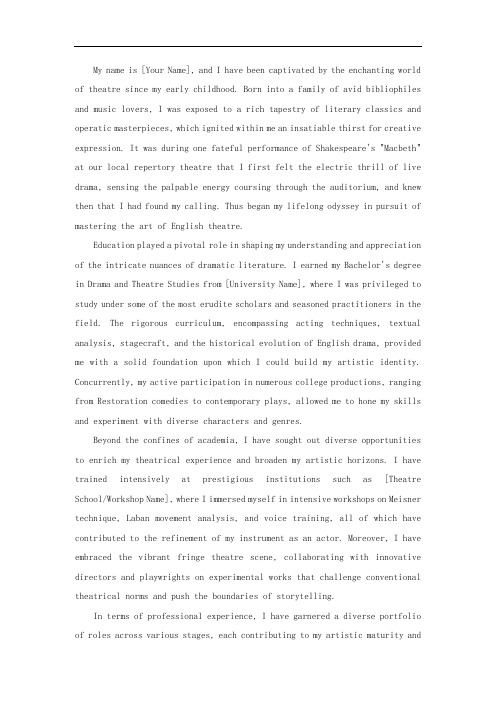
My name is [Your Name], and I have been captivated by the enchanting world of theatre since my early childhood. Born into a family of avid bibliophiles and music lovers, I was exposed to a rich tapestry of literary classics and operatic masterpieces, which ignited within me an insatiable thirst for creative expression. It was during one fateful performance of Shakespeare's "Macbeth" at our local repertory theatre that I first felt the electric thrill of live drama, sensing the palpable energy coursing through the auditorium, and knew then that I had found my calling. Thus began my lifelong odyssey in pursuit of mastering the art of English theatre.Education played a pivotal role in shaping my understanding and appreciation of the intricate nuances of dramatic literature. I earned my Bachelor's degree in Drama and Theatre Studies from [University Name], where I was privileged to study under some of the most erudite scholars and seasoned practitioners in the field. The rigorous curriculum, encompassing acting techniques, textual analysis, stagecraft, and the historical evolution of English drama, provided me with a solid foundation upon which I could build my artistic identity. Concurrently, my active participation in numerous college productions, ranging from Restoration comedies to contemporary plays, allowed me to hone my skills and experiment with diverse characters and genres.Beyond the confines of academia, I have sought out diverse opportunities to enrich my theatrical experience and broaden my artistic horizons. I have trained intensively at prestigious institutions such as [Theatre School/Workshop Name], where I immersed myself in intensive workshops on Meisner technique, Laban movement analysis, and voice training, all of which have contributed to the refinement of my instrument as an actor. Moreover, I have embraced the vibrant fringe theatre scene, collaborating with innovative directors and playwrights on experimental works that challenge conventional theatrical norms and push the boundaries of storytelling.In terms of professional experience, I have garnered a diverse portfolioversatility. From portraying the brooding, morally ambiguous Prince Hal in "Henry IV, Part 1" at the [Theatre Company Name] to bringing to life the complex, emotionally vulnerable Catherine in David Auburn's Pulitzer Prize-winning "Proof" at the [Festival Name], I have consistently strived to imbue my characters with depth, authenticity, and humanity. These experiences have taught me the importance of empathy, research, and thorough character work in crafting compelling performances that resonate with audiences long after the curtain falls.Central to my artistic philosophy is the belief that theatre is a powerful tool for social commentary, personal reflection, and communal healing. I am drawn to roles and projects that tackle pressing societal issues, challenge stereotypes, and stimulate meaningful dialogue. For instance, my portrayal of a transgender woman struggling for acceptance in [Playwright Name]'s "Transitions" not only deepened my understanding of the LGBTQ+ experience but also served as a catalyst for audience members to engage in heartfelt conversations about gender identity and inclusivity. Similarly, my involvement in site-specific, community-based productions, like an adaptation of "A Midsummer Night's Dream" set in a local park, has reinforced my conviction in theatre's ability to break down barriers, foster connections, and invigorate public spaces.Looking ahead, I aspire to continue expanding my repertoire, embracing new challenges, and contributing to the vibrant tapestry of English drama. I am particularly keen on exploring the intersection of technology and theatre, whether it be through immersive, interactive performances or digital platforms that democratize access to the arts. Furthermore, I aspire to nurture the next generation of theatre artists by teaching acting workshops, mentoring aspiring performers, and advocating for increased arts education in schools.In conclusion, I am an actor deeply committed to the exploration, preservation, and advancement of English drama. My journey thus far has beenthe lives of those whom my work has touched. As I stand before you today, I am filled with gratitude for the myriad experiences and collaborations that have shaped me, and I eagerly anticipate the future chapters yet to be written in this endlessly fascinating, ever-evolving story we call theatre. Thank you for your attention, and may our shared passion for this transcendent art form continue to illuminate the path ahead.。
中国戏剧英文作文

中国戏剧英文作文(中英文实用版)Drama, an integral part of Chinese culture, has spanned thousands of years, enchanting audiences with its unique blend of artistic expression. From the intricate masks of Sichuan Opera to the graceful movements of Peking Opera, each genre offers a fascinating journey into the rich heritage of China.中国戏剧,作为中华文化不可或缺的一部分,已有数千年的历史,其独特的艺术表现手法一直吸引着观众的目光。
无论是四川变脸的精巧面具,还是京剧的优雅身段,每种戏剧类型都为我们提供了深入探索中国丰富文化遗产的迷人之旅。
The stagecraft of Chinese theatre is unparalleled, often featuring elaborate sets and costumes that transport the viewer to another era. The actors, with their skilled use of facial makeup, body language, and singing, bring to life stories that can be both heart-wrenching and awe-inspiring.中国戏剧的舞台艺术无可比拟,常常采用精致的布景和服装,让观众仿佛穿越到另一个时代。
演员们凭借高超的面部化妆、肢体语言和唱功,生动地演绎出既令人心碎又令人敬畏的故事。
In English education, writing about Chinese drama serves as a window into the country's vast cultural landscape. It allows students to appreciate not only the artistic beauty but also the historical and social significance embedded within each performance.在英语教育中,关于中国戏剧的写作成为了解这个国家广阔文化景观的一扇窗户。
中国戏剧英文介绍..

这是一个亮点,需要独特的绘画技巧。 演员的脸上被夸张地设计着,象征一个 角色的性格、角色和命运。这种技术 可能源于古老的宗教和舞蹈。
White: Sinister(阴险), evil, crafty(狡 猾), treacherous(奸诈), and suspicious. Anyone wearing a white mask is usually the villain(坏 人). Green: Impulsive(冲动的), violent, no self restraint or self control. Red: Brave, loyal. Black: Rough, fierce( 暴躁的 ), or impartial(公正的). Yellow: Ambitious, fierce, coolheaded.
Chinese opera together with Greece tragic-comedy(希腊悲喜剧) and Indian Sanskrit Opera(印度梵剧) are the three oldest dramatic art forms in the world.
chinese opera
During the Qing Dynasty (1644 - 1911), it became fashionable among ordinary people. Performances were watched in tearooms, restaurants, and even around makeshift stages. 在清朝(1644 - 1911),它在普通百姓中十分流 行。在茶室,餐馆,甚至在临时搭建的舞台上都可以 看见表演。
What appeals to foreigners most might be the different styles of facial make-up which is one of the highlights and requires distinctive(独特的) techniques of painting. Exaggerated designs are painted on each performer's face to symbolize a character's personality, role, and fate. This technique may have originated from ancient religions and dance.
世界戏剧 中文英语双语介绍
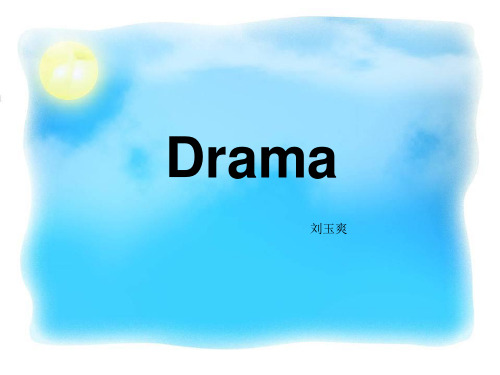
(一 八九 九 ~ 一九 六六 )
Lao She (1899-1966), real name Shu Qingchun, was of Manchurian descent and the famous novelist, litterateur and dramatist. (老舍,原名舒庆春,字舍予,笔名老舍。北京满族 正红旗人,中国现代著名小说家、文学家、戏剧家。)
结局是故事的结论。喜剧结束,主角比在故事的 开端有更好的结果。悲剧结束在灾难中,主角是 不如在故事的开始。更现代的作品可能并没有结 局而是展现一个快速的或令人惊讶的结尾。
《茶馆》
1 2
This is one of the famous dramas by Lao She. The drama is set in a typical, old Beijing teahouse and follows the lives of the owner and his customers through three stages in modern Chinese history. (这是一部老舍写的很有名的话剧。话剧的场景设在一个典型的 老北京茶馆里,描述了店家和喝茶人分布在现代中国历史上三个 阶层的生活。)
the city-state of Athens produced three genres of drama: tragedy, comedy, and the satyr play(【古希腊】森林之神滑稽短歌剧, 萨堤罗斯滑稽剧).
西方戏剧起源于古希腊。雅典城邦的 戏剧文化产生 了三个剧种:悲剧,喜剧, 和羊人剧。。
《茶馆》
1 2
Click to add title in here Click to add title in here Click to add title in here
有关戏剧的英文作文

有关戏剧的英文作文英文:Drama is a form of art that has been around for centuries. It involves the use of dialogue, acting, and stagecraft to tell a story. Drama can be seen in various forms, such as plays, musicals, operas, and even films.Personally, I find drama to be a fascinating art form. It has the ability to transport the audience to different worlds and evoke a range of emotions. When watching a play or musical, I feel as though I am a part of the story, experiencing the characters' joys and sorrows alongside them.One of my favorite examples of drama is the musical Hamilton. It tells the story of Alexander Hamilton, one of America's founding fathers, through a combination of rap, hip hop, and traditional musical theater. The music and lyrics are incredibly well-crafted, and the performancesare nothing short of breathtaking. Watching Hamilton is an emotional rollercoaster, as it covers themes such as love, loss, and the pursuit of power.中文:戏剧是一种已经存在了几个世纪的艺术形式。
10 中国戏剧 英文版

• Peking Opera, China's "national essence", national opera, has been 200 years old, enjoying high reputation both at home and abroad.
• The SHENG (生) is the main male role in Peking opera.
• The DAN (旦) refers to any female role in Peking opera
• The JING (净) is a painted face male role.
• Green: Impulsive, violent, no self restraint or self control.
Red: Brave, loyal.
• Black: Rough, fierce, or impartial.
Yellow: Ambitious, fierce, cool-headed.
• The CHOU (丑) is a male clown role.
• Beijing opera types of facial makeup in operas, is a special feature of a national cosmetic.
• White: Sinister, evil, crafty, treacherous, and suspicious. Anyone wearing a white mask is usually the villain.
What is the quintessence [kwin‘tesəns](国粹) of China?
中国戏曲英文作文初中

中国戏曲英文作文初中英文:Chinese opera, also known as Xiqu, is a traditional form of performing arts in China. It has a history of over 2000 years and is considered as one of the three oldest dramatic art forms in the world. Chinese opera is very diverse and includes several different regional styles, such as Peking opera, Cantonese opera, and Sichuan opera.I remember the first time I watched a Chinese opera performance. It was a Peking opera called "Farewell My Concubine". The costumes, makeup, and movements of the performers were so captivating. I was especially impressed by the "jing" role, who wore a painted face and performed acrobatic movements. The combination of singing, acting, and acrobatics in Chinese opera is truly amazing.中文:中国戏曲,也被称为戏曲,是中国传统的表演艺术形式。
它有着2000多年的历史,被认为是世界上三大最古老的戏剧形式之一。
中国戏剧英文介绍
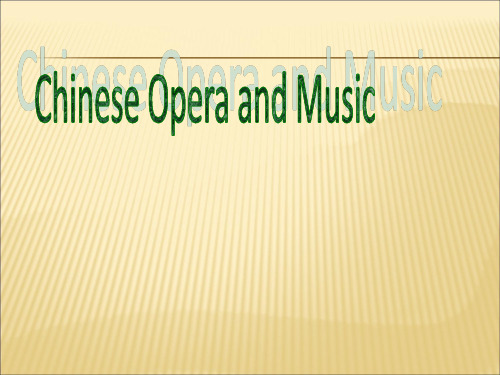
Introduction of operas in different period
Ming Dynasty
1.Definition: The dominant form of the Ming (1368–1644) and early Qing dynasties was Kunqu, which originated in the Wu cultural area. It later evolved into a longer form of play called chuanqi(传奇), which became one of the 5 melodies that made up Sichuan opera.[4] Currently Chinese operas continue to exist in 368 different forms, the best known being Beijing opera, which assumed its present form in the mid-19th century and was extremely popular in the latter part of the Qing Dynasty (1644–1911).
Introduction of operas in different period
Ming Dynasty
3.Famous playwrights and Representatives:《十五贯》《占花魁》《浣纱 记》《牡丹亭》(汤显祖)
4. Characteristics: 昆山腔—— classic and graceful 弋 阳 腔 ——popular, folk-custom, and focus on the
中国戏剧英文介绍

Peking Opera
Although it is called Peking Opera, the origins of Peking Opera are not in Beijing but in the provinces of Anhui and Hubei. Peking Opera is a purely Chinese opera form dating back to the year 1790, when the famous Four Anhui Opera Troupes(剧团) first came to Beijing in celebration of the 80th birthday of Emperor Qianlong . It was after 1840 that Peking Opera formally took shape, growing even faster during the reign of the Empress Dowager Cixi, who was an opera aficionado.and eventually prevalent around the country.
夫妻双双把家还
树上的鸟儿成双对 绿水青山带笑颜 从今再不受那奴役苦 夫妻双双把家还 你耕田来我织布 我挑水来你浇园 寒窖虽破能避风避雨 夫妻恩爱苦也甜 你我好比鸳鸯鸟 比翼双飞在人间
川剧Sichuan Opera
Sichuan Opera,is popular in the eastern of Sichuan, Chongqing , Guizhou and central parts of Yunnan. Face-changing is an important part of Sichuan opera performance art.It is a "moment of art",according to the need of the story,actors change the different masks in a very short time of raising hands or tossing sleeve durning the perform.
关于戏剧知识的作文英语

关于戏剧知识的作文英语英文:As a drama enthusiast, I have always been fascinated by the world of theater. Drama, also known as a play, is aform of literature that is performed by actors on stage. It is a powerful and expressive art form that has the abilityto entertain, educate, and inspire audiences.One of the most intriguing aspects of drama is itsability to transport the audience to different times and places. For example, when I watched a production of William Shakespeare's "Romeo and Juliet," I was completely immersed in the world of 16th century Verona. The language, costumes, and set design all worked together to create a vivid and realistic portrayal of the story.In addition to its ability to transport audiences, drama also has the power to evoke strong emotions. I remember watching a performance of Arthur Miller's "TheCrucible," and feeling a sense of fear and tension as the characters grappled with the Salem witch trials. Theactors' performances were so convincing that I felt as though I was experiencing the events firsthand.Furthermore, drama provides a platform for social commentary and reflection. Plays such as Lorraine Hansberry's "A Raisin in the Sun" and August Wilson's "Fences" tackle important issues such as race, class, and family dynamics. These plays not only entertain, but also challenge audiences to think critically about the world around them.In conclusion, drama is a rich and diverse art formthat has the power to transport, evoke emotions, and provoke thought. It is a medium through which stories can be brought to life and shared with audiences. I am continually amazed by the impact that drama can have, and I look forward to experiencing many more powerful andthought-provoking performances in the future.中文:作为一个戏剧爱好者,我一直对戏剧的世界充满着兴趣。
英文戏剧英语作文
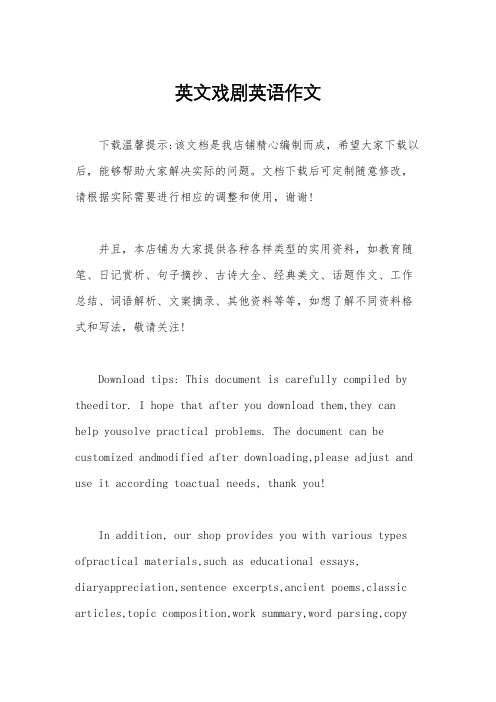
英文戏剧英语作文下载温馨提示:该文档是我店铺精心编制而成,希望大家下载以后,能够帮助大家解决实际的问题。
文档下载后可定制随意修改,请根据实际需要进行相应的调整和使用,谢谢!并且,本店铺为大家提供各种各样类型的实用资料,如教育随笔、日记赏析、句子摘抄、古诗大全、经典美文、话题作文、工作总结、词语解析、文案摘录、其他资料等等,如想了解不同资料格式和写法,敬请关注!Download tips: This document is carefully compiled by theeditor. I hope that after you download them,they can help yousolve practical problems. The document can be customized andmodified after downloading,please adjust and use it according toactual needs, thank you!In addition, our shop provides you with various types ofpractical materials,such as educational essays, diaryappreciation,sentence excerpts,ancient poems,classic articles,topic composition,work summary,word parsing,copyexcerpts,other materials and so on,want to know different data formats andwriting methods,please pay attention!Hey, there's this really cool drama I saw once. The actors were amazing, they really brought the story to life.Another drama I remember was really intense. The plot had so many twists and turns, it kept me on the edge of my seat.Oh, and there was this one play with the most beautiful set design. It was like stepping into another world.I also like those dramas that make you think. They have deep meanings and messages that stay with you long after the show is over.。
(完整版)戏剧英文介绍

Yellow: Ambitious, fierce, coolheaded.
Blue: Steadfast(坚定的), someone who is loyal and sticks to one side no matter what.
chinese opera
During the Tang Dynasty (618 – 907), the Emperor Taizong established an opera school with the poetic name Liyuan (Pear Garden). From that time on, performers of Chinese opera were referred to as 'disciples of the pear garden'.
suspicious. Anyone wearing a white mask is usually the villain(坏 人).
Green: Impulsive(冲动的), violent, no self restraint or self control.
Red: Brave, loyal.
chinese opera
Chinese opera together with Greece tragic-comedy(希腊悲喜剧) and Indian Sanskrit Opera(印度梵剧) are the three oldest dramatic art forms in the world.
The Development of Chinese Opera
西方戏剧史简版英文版
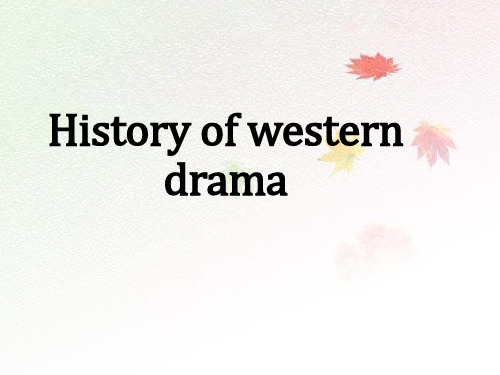
Genres of the period
Genres of the period included the history play, which depicted English or European history. Shakespeare's plays about the lives of kings, such as Richard III and Henry V, belong to this category, as do Christopher Marlowe's Edward II and George Peele's Famous Chronicle of King Edward the First. History plays dealt with more recent events, like A Larum for London which dramatizes the sack of Antwerp in 1576.
• Tragedy was a very popular genre. Marlowe's tragedies were exceptionally successful, such as Dr. Faustus and The Jew of Malta. The audiences particularly liked revenge dramas, such as Thomas Kyd's The Spanish Tragedy. The four tragedies considered to be Shakespeare's greatest (Hamlet, Othello, King Lear, and Macbeth) were composed during this period. • Comedies were common, too. A subgenre developed in this period was the city comedy, which deals satirically with life in London after the fashion of Roman New Comedy. Examples are Thomas Dekker's The Shoemaker's Holiday and Thomas Middleton's A Chaste Maid in Cheapside.
英文戏剧剧本:简奥斯汀传

Jane Austen简·奥斯汀场景一(2min)旁白:Jane Austin, a daughter of a country priest, owns love for writing and possesses independent thinking. Tom Lefroy was born impoverished and was raised by his uncle, a famous attorney in the city. He is a womanizer, and thus is sent to the countryside as a punishment. There he meets Jane. They fall in love with each other. At the same time, Mr.Wisle y, Lady Gresham’s nephew and also her heir, offers his proposal to Jane. To satisfy her nephew’s will, Lady Gresham tries to per suade Jane to accept.简·奥斯汀是一个乡村牧师的女儿,她热爱写作,思想独立,虽然家境贫穷,但备受父母疼爱。
汤姆·勒弗罗伊家境贫寒,受其舅舅——城里著名律师供养。
汤姆风流成性,被舅舅惩罚送往乡下思过,碰上了简。
二人相互吸引。
与此同时,当地有钱人格萊谢姆夫人的侄子,即她的财产继承人,向简求婚。
格萊谢姆夫人为了满足其侄子的愿望,试图说服简。
Lady Gresham: You should accept at once. My nephew Wiseley, Miss Austen, condescends far indeed in offering to the daughter of an obscure and impecunious clergyman.格萊谢姆夫人:我外甥卫斯理,如此屈尊向一个牧师的女儿示爱。
京剧英文介绍

正 旦
花 旦
老 旦
彩 旦
The make up for sheng and dan roles should highlight(突出) the eyes and eyebrows and the application of rouge. This type of make up is known as the sumian 素 面(plain face).
Wenchang and Wuchang 文场和武场
Piao You and Xia Hai 票友和下海
Longtao and Figurant "龙套”和 “跑龙套” Qiba “起霸” Liangxiang “亮相”
Thank you
净
it is also known as the painted face, used on a chivalrous(彬彬 有礼的) and rugged male role.
丑
it is also known as the little painted face, used on villainous(罪恶 的) or comic (滑稽的) characters.
Worn-out face (polian 破脸)
Also called broken face or old face, the strokes, patterns and colours used on these faces are more complicated(复 杂). They express the character‘s innermost (内心深处的)feelings.
Hang dang
生
a male role, such as a young man, an elderly man, or a warrior(勇士).
最著名的戏剧之一英文作文

最著名的戏剧之一英文作文One of the most famous plays in the world is "Romeo and Juliet" by William Shakespeare. It tells the tragic love story of two young lovers from feuding families. The playis filled with passion, romance, and intense emotions that captivate audiences."Romeo and Juliet" is set in Verona, Italy, and explores themes of love, fate, and the consequences of impulsive actions. The characters are well-developed and relatable, making the audience emotionally invested intheir journey. The play's timeless themes and universal appeal have made it a favorite among theater-goers for centuries.The language used in "Romeo and Juliet" is poetic and lyrical, with beautiful soliloquies and dialogues that showcase Shakespeare's mastery of the English language. The play is known for its famous quotes, such as "What's in a name? That which we call a rose by any other name wouldsmell as sweet" and "O Romeo, Romeo, wherefore art thou Romeo?"The play's tragic ending, with the deaths of Romeo and Juliet, has made it a classic tragedy. It explores the devastating consequences of hatred and prejudice and serves as a cautionary tale about the destructive power of feuds and violence. The play's ending leaves a lasting impact on the audience, evoking a range of emotions from sadness to reflection."Romeo and Juliet" has been adapted into various forms, including films, ballets, and operas. Its enduring popularity is a testament to its universal themes and timeless appeal. The play continues to be performed all over the world, captivating audiences with its timeless story of love and tragedy.In conclusion, "Romeo and Juliet" is one of the most famous plays in the world, known for its passionate love story, poetic language, and tragic ending. Its universal themes and relatable characters have made it a favoriteamong audiences for centuries. Whether read or performed on stage, this play continues to captivate and move audiences with its timeless tale of love and tragedy.。
介绍一种京剧中戏剧的作文
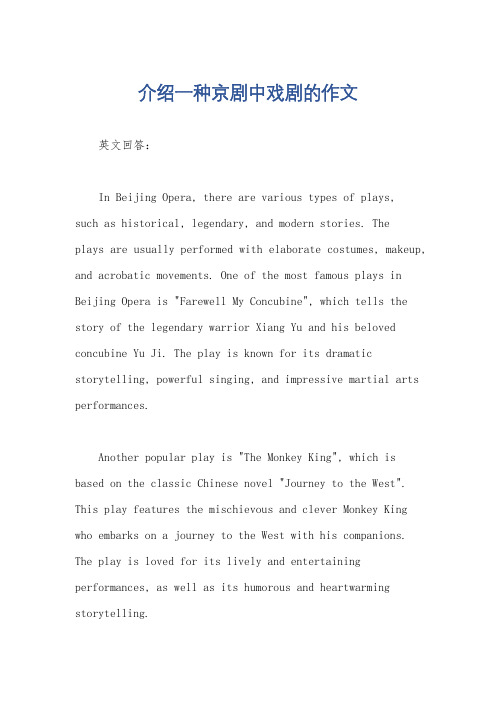
介绍一种京剧中戏剧的作文英文回答:In Beijing Opera, there are various types of plays,such as historical, legendary, and modern stories. Theplays are usually performed with elaborate costumes, makeup, and acrobatic movements. One of the most famous plays in Beijing Opera is "Farewell My Concubine", which tells the story of the legendary warrior Xiang Yu and his beloved concubine Yu Ji. The play is known for its dramatic storytelling, powerful singing, and impressive martial arts performances.Another popular play is "The Monkey King", which is based on the classic Chinese novel "Journey to the West". This play features the mischievous and clever Monkey King who embarks on a journey to the West with his companions. The play is loved for its lively and entertaining performances, as well as its humorous and heartwarming storytelling.中文回答:在京剧中,有各种各样的戏剧类型,比如历史故事、传奇故事和现代故事。
介绍京剧高一英语作文

介绍京剧高一英语作文Beijing Opera, also known as Peking Opera, is a traditional Chinese art form that combines music, singing, dialogue, mime, acrobatics, and martial arts. It has a history of over 200 years and is considered a national treasure in China. Beijing Opera is known for its colorful costumes, elaborate makeup, and unique vocal style.The origins of Beijing Opera can be traced back to the Qing Dynasty, when it was created as a form ofentertainment for the imperial court. Over time, it evolved into a popular form of entertainment for the general public, with performances being held in teahouses, theaters, and open-air stages. Beijing Opera is known for its use of symbolism and metaphor, with each movement and gesture having a specific meaning.One of the key elements of Beijing Opera is the use of facial makeup, known as "jing". The makeup is used to represent different characters, with each color and designsymbolizing a different personality trait or emotion. For example, red represents loyalty and courage, while black represents honesty and integrity. The makeup is applied using traditional techniques and can take hours to complete.Another important aspect of Beijing Opera is the music, which is a combination of vocal and instrumental performances. The vocal style is known for its high-pitched singing, with performers using a technique called "jinghuang" to create a unique sound. The music is accompanied by traditional Chinese instruments such as the erhu, pipa, and gong.In addition to music and makeup, Beijing Opera also incorporates elements of acrobatics and martial arts. Performers are trained in a variety of skills, including tumbling, juggling, and sword fighting. These skills are used to enhance the storytelling and create dynamic and exciting performances.Overall, Beijing Opera is a rich and vibrant art form that has been passed down through generations. It continuesto be popular in China and around the world, with performances being held in theaters, opera houses, and cultural events. Beijing Opera is a true reflection of Chinese culture and tradition, and its beauty and complexity continue to captivate audiences of all ages.。
- 1、下载文档前请自行甄别文档内容的完整性,平台不提供额外的编辑、内容补充、找答案等附加服务。
- 2、"仅部分预览"的文档,不可在线预览部分如存在完整性等问题,可反馈申请退款(可完整预览的文档不适用该条件!)。
- 3、如文档侵犯您的权益,请联系客服反馈,我们会尽快为您处理(人工客服工作时间:9:00-18:30)。
●Classification
of drama
The two masks associated with drama represent the traditional generic (通称)division between comedy and tragedy. They are symbols of the ancient Greek Muses(缪斯,司文艺、音乐、美术的女神), Thalia(赛利尔, 喜剧的女神) and Melpomene(黑尔波墨涅,司悲剧之缪斯). Thalia was the Muse of comedy (the laughing face), while Melpomene was the Muse of tragedy (the weeping face).
♣In addition to Shakespeare, such authors as Christopher Marlowe,
Thomas Middleton were prominent playwrights during this period.
♣As in the medieval period, historical plays celebrated the lives of
♣The structure of dramatic texts, unlike other forms of literature, is
directly influenced by this collaborative production and collective reception
●History
●Dramatic
structure
Dramatic structure is the structure of a dramatic work such as a play or film. Many scholars have analyzed dramatic structure, beginning with Aristotle in his Poetics.
♣The first important works of Roman literature were the tragedies and
comedies that Livius Andronicus wrote from 240 BCE.
♠Medieval
♣In the Middle Ages, drama in the vernacular(本地语言) languages of Europe may have emerged from religious enactments of the liturgy(礼 拜仪式). Mystery plays were presented on the porch of the cathedrals or
The dénouement serves as the conclusion of the story. The comedy ends with a dénouement in which the protagonist is better off than at the story's outset. The tragedy ends with a catastrophe in which the protagonist is worse off than at the beginning of the narrative. More modern works may have no dénouement, because of a quick or surprise ending.
♠Modern and postmodern
♣The pivotal and innovative contributions of the 19th-century Norwegian
dramatist Henrik Ibsen and the 20th-century German theatre practitioner Bertolt Brecht dominate modern drama; each inspired a tradition of imitators, which include many of the greatest playwrights of the modern era.
♠Rising action
The basic internal conflict is complicated by the introduction of related secondary conflicts, including various obstacles that frustrate the protagonist's attempt to reach his goal.
♠Climax
The third act is the climax, or turning point, which marks a change, for the better or the worse, in the protagonist’s affairs. If the story is a comedy, things will have gone badly for the protagonists firstly; and then things will begin to go well for them. If the story is a tragedy, things wil go from good to bad for the protagonists. Simply put, this is where the most dramatic part.
past kings, enhancing the image of the Tudor monarchy. Authors of this period drew some of their storylines from Greek mythology and Roman mythology or from the plays of eminent Roman playwrights .
♠Exposition or Introduction
The exposition provides the background information needed to properly understand the story, such as the problem in the beginning of the story.
●Satyr
play
♠Satyr plays were an ancient Greek form of tragicomedy, similar in
spirit to burlesque(讽刺作品). They featured choruses of satyrs, were based on Greek mythology, and were rife with mock drunkenness, brazen sexuality, pranks, sight gags, and general merriment. Satyric drama was one of the three varieties of Athenian drama, the other two being tragedy and comedy. It can be traced back to Pratinas of Phlius, circa 500 BC.
by strolling players on feast days.
♠Elizabethan and Jacobean
♣One of the great flowerings of drama in England occurred in the 16th
and 17th centuries. Many of these plays were written in verse, particularly iambic pentameter(抑扬格五步音).
♠Tragedy
Drama
——熊梦蕴
●
Drama
♣Drama is the specific mode of fiction represented in performance. The
term comes from a Greek word meaning "action" which is derived from "to do". The enactment of drama in theatre, performed by actors on a stage before an audience, presupposes(预先假定) collaborative(合作的) modes of production and a collective form of reception.
of Western drama
♠Classical Athenian drama
♣Western drama originates in classical Greece. The theatrical culture of
the city-state of Athens produced three genres of drama: tragedy, comedy, and the satyr play(【古希腊】森林之神滑稽短歌剧, 萨堤罗斯滑稽剧). Their origins remain obscure, though by the 5th century BCE they were institutionalised in competitions held as part of festivities celebrating the god Dionysus(狄俄尼索斯:酒神和宗教狂欢庆祝大自然权力和丰饶之神) .
